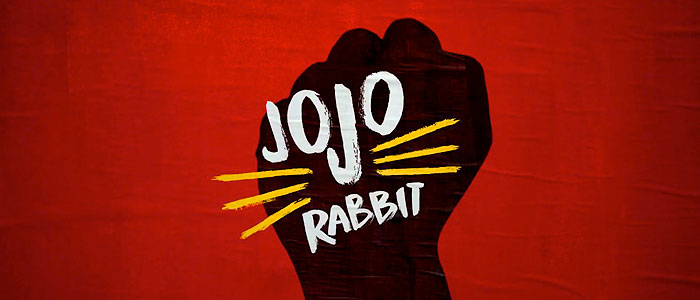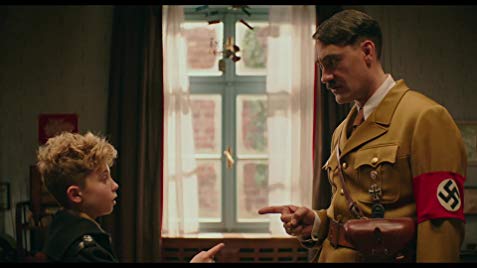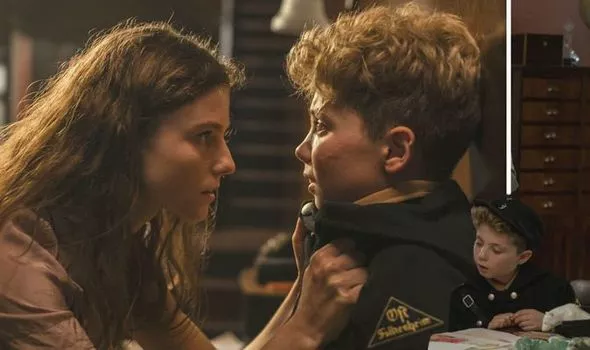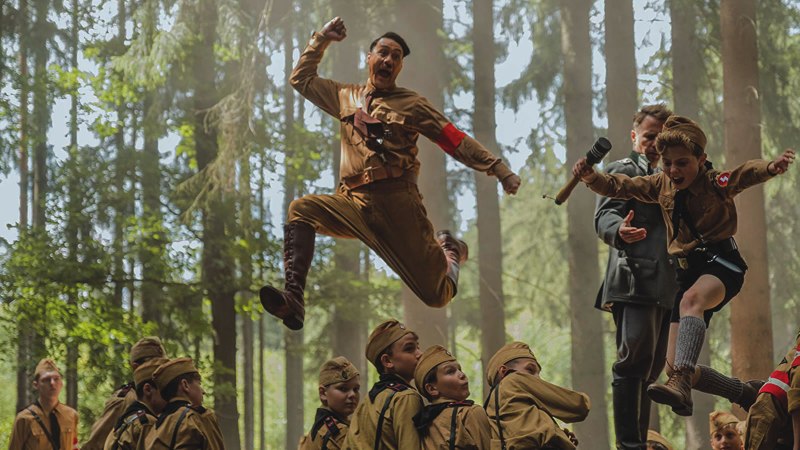Jojo Rabbit – The Nazi Comedy That Struck A Chord by Sidestepping Modern Racism

When asked why he chose to play Adolf Hitler in his WW2 comedy, Jojo Rabbit, Taika Waititi’s response was documented far and wide in a multitude of media outlets – “what better fuck you to that guy?” Referring to how he self-identifies as a “Polynesian Jew”.
And he’s not wrong. That is a great way to tarnish one of the evillest men to come out of Europe. But that sentence in itself brings up another point. He already is one of the most abhorrent characters in history, and that’s generally accepted around the world. Which leads you to ask the question – is another film revealing the severe inhumanity of the Nazi party really what we need in modern society? Especially when there are so many more prescient issues also being discussed.
This article will delve into how a film like Jojo Rabbit portrays race issues and the disparity between that and other examples of nuanced modern racism.

The Overt and the Nuanced
Leaving larger examples of racial tensions, like the Unite to Right rally in Charlottesville, to one side, many matters of racism in modern life are much more nuanced than the overtness of the Nazi doctrine of ethnic cleansing.
The violence of the American Civil Rights Movement, the despicable actions of the Klu Klax Klan, the widespread hate crimes committed by the National Front in the UK – these are all easily condemnable acts of racial hatred that don’t need great analysis for people to be on the same page. But, the discourse is different now. Acts like these still happen, albeit on a smaller scale, but it’s when seemingly “subtler” race issues are highlighted that the divide of our current culture becomes most apparent.
A large number of white people feel like after, for want of a better word, “solving” these overt acts of racism – the battle is over. To this group of white people, the fact that any minorities could possibly complain about things as trivial as the Oscars having a 92% white membership when just 30 years ago they were being attacked on the streets – is completely baffling. But in a way, that’s exactly why we can see these more nuanced takes on hatred. Now, the large swathes of racial attacks have mostly subsided – we’re left to see more subtle examples that were previously ignored.
Many people call these acts ‘everyday racism’ – views and actions that are institutionalised or deeply ingrained in our cultural psyche. Think of Donald Trump using the phrase “go back where you came from.” A line which has endless amounts of emotional baggage for any person of colour who has migrated to another country.

The line itself stems from the longer version of the phrase – “if you don’t like it here, then why don’t you go back where you came from?” Defenders of this sentiment label it purely as patriotic and/or nationalistic, stating it’s more of a comment on how their country runs rather than any comment on migrants living in that very same country. But this language isn’t that anymore, it’s been weaponised.
This phrase, and many others like it, have been used in conjunction with numerous acts of racism and hate crimes, thus changing its impact. And for a person in the public eye, let alone in the highest office of the “free world”, to use it so casually – it basically sanctions his followers to do the same.
Even though it’s quite a broad version of it, Trump using this language is highly codified. He doesn’t actually say anything racist, but it’s implied because of the history of both his views and the phrase.
Stepping away from codified language for a second, another complicated part of modern racism is humour.
Many people still defend certain views or attitudes under the premise of comedy. Think of Boris Johnson referring to Muslim women as letterboxes, with thousands of people rushing to protect his right to make a “joke”.

One such person being Rowan Atkinson, the actor behind Mr Bean. Atkinson said.
“As a lifelong beneficiary of the freedom to make jokes about religion, I do think that Boris Johnson’s joke about wearers of the burka resembling letterboxes is a pretty good one. All jokes about religion cause offence, so it’s pointless apologising for them. You should really only apologise for a bad joke. On that basis, no apology is required.”
Without taking any approach of dissecting what he actually said, the sentiment of his response basically translates to “if it’s funny, it’s fine”. But isn’t comedy subjective? And shouldn’t the people who the joke is aimed at be the ones to decide whether it’s funny?
Words are a much harder thing to overtly persecute than actions. They’re slippery, people can wriggle out of them, and as Kendall Roy proclaims on Succession, “words are nothing, just complicated airflow.”
Culture of Division
As recent elections, referendums, and re-elections have shown us – modern society is an incredibly divided one. Just look at another recent release, The Hunt, for more evidence. And that division in modern life is best represented when it comes to matters of racism, and indeed, what is even deemed as racist.
Racism hasn’t gone away in the 21st century, it’s simply shifted gears. It’s much less obvious in modern society, for every person of colour calling out racial micro-aggressions and highlighting the hypocrisy of white privilege, there are an equal amount of alt-right commentators illustrating the increasingly hazardous plight of the white person.
A perfect recent example of this centres on the recent issue of Prince Harry and Meghan Markle leaving the UK for Canada.

The popular UK breakfast show, This Morning, ran a feature entitled “Is Racism At the Heart of Meghan and Harry’s Departure?” In the segment, Women’s Rights Activist Dr Shola Mos-Shogbamimu explained that the treatment of Meghan stemmed from “a culture of racism in the United Kingdom”.
At this point, one of the presenters, Philip Schofield, asks the question “what examples do you have?”
To which, Dr Mos-Shogbamimu responds “where have you been the past two years?”

This brief exchange perfectly shows how far apart the two perceived sides of culture are from one another – with neither of them willing to see the other’s point of view. One of them is completely oblivious to what they’re talking about, while the other is so dumbfounded they can’t even muster the energy to list the events.
Is it All Just a Joke?

One incident that Dr Mos-Shogbamimu could have referenced was when British TV personality Danny Baker tweeted a picture of a chimpanzee and claimed it was Prince Harry and Meghan Markle’s baby son.
Multiple people from either side of the debate leapt into the discussion of this joke, some to defend, some to condemn. But regardless of your opinion on whether this was a legitimate joke to make, the fact remains, he wasn’t making a similar comparison to Prince William and Kate Middleton’s child.
So, how does Jojo Rabbit fit into all this?
Nominated for six Academy Awards this year, a total which is exactly six times more than any of Waititi’s previous feature films – that all share a light-hearted tone and whimsical humour. It’s this same climate of a divided society that makes Jojo Rabbit’s success unsurprising.
Regardless of what side of the fence you sit on, everyone can agree that overt racism and bigotry is bad – and that’s why everyone can get behind a film like Jojo Rabbit. The views shared in the movie are so outrageous and demonic that no one in their right mind could even start to defend them.
Through A Child’s Eyes
Not content with purely portraying adult Nazis with these wildly outrageous views, the movie actually has the lead character of Jojo, a 10-year-old in the Hitler Youth, share some of the most abhorrent views. Mentioning that Jews have horns, drawing them as fantastical creatures, and referring to them as non-human.
Hearing these outlandish words from a child does two things simultaneously, firstly, it makes them sound even more ridiculous. And secondly, it exposes a key way of how people attain views in the first place – being taught them.
When it comes to these outdated views on race, Jojo’s opinions in the movie are completely sculpted by those around him. Firstly, by the Nazis he so idolises. And then secondly, by the Jewish girl his mother is harbouring in their house.

His default views are based completely on the words of others, believing everything he’s told – as many students with no contrasting evidence would do. But as he actually accrues some life experience for himself, namely spending time with a Jewish person, he breaks the shackles of his previously held ‘blind fanaticism’, as Stephen Merchant’s character refers to it in the movie.
Jojo’s journey into tolerance is one that generally works on most people. The more personal experience and connections one makes with people from different walks of life, the more they see them as human, and the less they believe in generalising or assumptive stories that aren’t based on fact.
So, watching a child go on this journey is obviously quite cathartic – showing that people’s extreme opinions can be changed. But despite this, simply watching a film that has this type of story doesn’t actually replicate it for the audience. Especially, when you consider how much more stubborn adults can be too.
Culture Caricature
Looping back around to Taika Waititi himself, he claimed that he did next to no research for his portrayal of Adolf Hitler, stating that he didn’t need to “because he was such a fucking cunt, and everyone knows that as well.” While this fits into his objective of further besmirching his legacy, it also undercuts the effectiveness of a plot point later on in the movie.

Throughout the first part of the movie, Waititi’s Hitler is the butt of the jokes. Yes, Jojo idolises him, but the audience laughs at his outlandish claims and clearly transparent lies. Whether that’s because we all know about his eventual demise, or just that it’s so surprising to hear this sort of racist discourse in the context of a big-budget comedy, seeing Hitler portrayed like this is very different. But, he is still Hitler. And when you think about the ideas behind the words being used for punchlines, they’re filled with an unbelievable amount of hate.
As Jojo is finally coming around to losing his stereotypical views of non-Aryan people, a final exchange with Hitler really brings it home. Losing his temper for the very first time, we see him for what he truly is – helping Jojo sever all ties with his Nazi identity. But, that doesn’t happen for the audience. Well, not the majority of them anyway.
Most viewers already know these ideas are outlandish. And taking the specific example of Nazis vs Jewish people out of the equation, this example of stereotypical caricatures being broken down isn’t particularly useful or applicable in the context of modern race issues.

Most people in modern society know that not all women are bad drivers, and expressing the opposite means you’re sharing a sexist opinion. The same for countless stereotypes across gender, race, and social lines. And seeing a rebuttal of these types of views on the big screen in 2020, as Jojo Rabbit does here, is something which feels a little out of sync for the younger generations. Like closing the stable door after the horse has already bolted.
And all of this isn’t to say the film isn’t good or enjoyable, it’s both! But it’s worrying that a movie that portrays racism as out and out evil, and as something that is so completely devoid of nuance is one of the only major Hollywood movies speaking about race right now. Especially in a time where there is so much more complexity out there.
What do you think? Leave a comment.











Before seeing it, It feared that the movie Jojo Rabbit might banalize nazism and war. The movie does none of it. Instead, it shows the horror of the end of war very much like German and Austrian people who went through the nightmare described it to me. The figure of a kid, Jojho Rabbit, seeking comfort in an imaginary friend is realistic. That this imaginary friend is Adolf Hitler is disturbing. This daring choice is however great because to most German and Austrian adults of the time the real Adolf Hitler was an idealized imaginary friend. In contrast to Jojo Rabbit, these adults were not mature enough to realize who their “friend” really was and in contrast to Jojo Rabbit did not throw him through the window. In my opinion, Jojo Rabbit is a great movie which cast a new and worthwhile glance an issue we could though already “overworked”.
There seemed to be a predisposition amongst some people against this film and I’ve no idea why.
Loved Jojo Rabbit and found it to be a powerful treatment of the core banality and absurdity of evil (and the human condition).
I liked it. It’s an unusual film in blending comedy, Nazism, and antisemitism. Any film like that is automatically on thin ice, and some will condemn it as sacrilegious. I winced every time the 10-year-old star breezily said: “I’m a Nazi,” with the same nonchalance a normal child would say “I collect seashells,” or “I like Fortnite.”
…dammit, it’s funny.
I suspect one of the reasons why it has got a few incredibly bad reviews is that when someone doesn’t ‘get’ comedy it makes them angry. There are some truly absurdist (and hilarious) moments in the film like Sam Rockwell’s new design for his uniform which I can imagine other people just not appreciating thus the negativity. For those who do get it though this film will go down as a classic.
It’s such a fine line, satirising Nazism without diminishing the horror. Distance makes it easier, but at the same time, distance makes it even more important that the horror is still recognised, in order that it not be repeated.
While there are also films like Son of Saul, a film like Jojo Rabbit can act as an escape valve. Mockery is as important an aspect of resistance as anything else. Sometimes, mockery can seem all there is. On a quite different scale than Hitler, an example might be the current US president, who seems immune to everything but mockery.
For me, the model is Vonnegut’s Slaughterhouse Five. Vonnegut experienced the bombing of Dresden, and he could respond to it only with an extraordinary SF satire. Others find their own ways. As long as the debate goes on, and films are made, and books are written, we can know that it has not been forgotten.
Sadly, that seems not to mean that it cannot be repeated.
The normalisation of the Nazi horror through comedy is deeply troubling. Millions died a terrible death – life under Nazism started as horrible for the few and engulfed a Nation.
It doesn’t normalise the horror, it just shows it through a child’s eyes, some of the horrors made me cry, but some of the humour made me laugh loudly. Give it a watch, I expect you’ll be pleasantly surprised at how well it works
It just didn’t gel for me. Part of what irked me is that Jojo not only survives his mishandling of a live grenade quite early on in the film, but the blast leaves him with only a few scratches and a slight limp. It’s like they shied away from him being overly injured lest it take up too much of the film’s budget.
The kid can’t tie his own shoes and lacks the co-ordination to wink yet appears to be left on his own at home for hours at a time, which not only deprives the film of its comedic moments with his friends and the bumbling Nazis but also diminishes the role of his mother.
The supposed sucker punch while he chases a butterfly through the snow had been signposted with all the subtlety of a cricket bat to the head with multiple scenes when a particular character is filmed in a peculiar way so you notice that character’s shoes.
There’s an odd moment towards the end when he tells his guest/captive Elsa that the Germans have repelled the invasion and won, which turns out to be a nod to the source material (in the book he becomes a sort of Josef Fritzl, leaving Elsa literally in the dark about the Allied victory for years).
I’m afraid on too many occasions I was looking at my watch.
I don’t see why not being able to tie your shoes or wink should prevent you from being left at home. There’s a war on. His father is away, his mother is presumably working. Seemed reasonable to me.
Why would he need to be more injured? Explosions can cause all sorts of injuries. What would it add to the film if he were more injured? Why wouldn’t they consider budget, and why don’t you assume that the primary reason for things happening is because that’s how they wanted the story to go? The film is clearly different from the book in all sorts of ways, and it sounds like the injuries he gets in the book just wouldn’t fit with the rest of the film.
As for being left alone for hours at a time, that’s how the world worked until a few years ago. I’ve never been any good at winking (I can tie my own shoes, though, I’m proud to say) and I spent a lot of time by myself at that age in the late 90s.
I can’t say I guessed the purpose of the shoe shots. There’s no particular reason the scene you’re talking about needed to be shot that way to focus on the shoes, so I don’t think it’s particularly obvious that that’s what the shots of shoes were leading to. “We’re seeing these shoes so we can identify their owner without seeing their face” seems like a reasonable guess. Inferring the circumstance in which that would happen seems like more of a stretch. If you’ve read the book, maybe that’s how you guessed what would happen?
I can’t wait to see this movie.
I really enjoyed the film and hats off to Waititi for having the guts to bring it to the screen. Wonderful, wonderful film. If you feel uneasy about the en-even and odd approach to the story telling then you’re not connecting with a big part of what Waititi set out to achieve. The viewer should feel uneasy and challenged. It’s not Disney.
Actually it was distributed by disney. But I get your point.
The close ups of the shoes is heartbreaking.
Great article. One of the best films, probably ever, about a child in a war zone, with only his limited perspective to judge events by.
It made me think, we still have children in war zones, and we are still fed insane propaganda.
I had serious reservations about watching the film due to its subject matter, but it’s way funnier than most recent ‘comedies’, verging on the utterly bonkers in places. It was never going to be easy portraying Hitler and Nazis in such a way without missing the horror of what happened, but coming from the perspective of a child works in such a situation, I’ll freely admit that while I bellylauged in places, I also wiped away tears in others
I thought it was funny and sweet when it needed to be, powerful and moving when it needed to be, and the performances are brilliant, as well as the art direction and use of music. I can’t quite understand why it has had near-universal poor reviews.
I am wary of any film that features Hitler, let alone a fantasy, comedy version. I feel that those family members who were killed in that era will somehow know and judge me for enjoying anything like this.
But I did watch Jojo – and on a Friday too, if you’re going to risk your soul, give it your all and do it on Shabbat- and it was quite good. It doesn’t confuse Hitler with the imaginary Hitler and at no point did I forget that the real Hitler was a vile horror.
There is nothing wrong with enjoying well-made comedy Hitlers or comedy Nazis. They are more formidable weapons against the ideology than any demonisation. The Great Dictator. To Bo Or Not To Be (Lubitsch and yes, also Brooks). And many others.
I watched Jojo Rabbit and found it very refreshing. It showed the horror of Nazism, it was also colourful and well written and also it had two very sad moments (won’t reveal for spoiler’s sake).
The day after I watched ‘Hunt for the Wilderpeople’, which I also really liked.
So the day after, I watched ‘What we do in the Shadows’ which was okay. It had three excellent lines. But out of the three, it was the weakest.
What I found over those three films is that you kind of liked all the characters. There was some redeeming nicety about them. Which would say something a lot about the cleverness of Waititi’s writing. In some of the interviews about Jojo Rabbit with Waititi and the cast, you find out that the Nazi party were bascially puny bureaucrats (hence Stephen Merchant’s performance and his four Gestapo friends). Or that Hitler didn’t really like his mustache, but it was something that people remembered him by. As a lover of foreign cinema and a disliker of anything Hollywood, I found these three films to be very pleasant to watch.
There does seem to be a degree of innovation in it.
JoJo Rabbit was a great film. I’m struggling to realise the negativity that it seems to generate. It’s a kids/family film ffs! It was brilliant to be able to take my two boys to see a film which isn’t about superheroes which not only they could enjoy (and they did, they loved it even more than I did) but that actually was about something.
Life Is Beautiful is the only time I’ve been willing the Nazis to win in a film, just so the annoying, cheeky, chirpy Italian would shut up.
It showed the horrors of Nazism and WW2, whilst also taking the piss out the absurdity of fascism and racism.
Personally I think Jojo Rabbit is a masterpiece. To take the piss out of Hitler and Hitler youth requires real genious. Maybe taika waititi can make a 1917 remake with a young hitler carrying messages between the trenches and win a best film Oscar. And if you liked Jojo I would recommend Troup Zero. Another funny movie with a message.
The film is brilliant, I took my 13 year old autistic son to see it, and he loved it too. It was a brilliant lesson for him on the toxicity of hatred, and how hatred affects your mental health. It has helped him too, for which I’ll always be grateful for. I was hoping that there would be more substance to the film than the trailers, and thankfully was proven right.
While watching, I could never forget the horror, pain and madness wrecked on the earth by the insane Hitler but revelled in this unique, clever satire
All well and good but there will be plenty who see this who don’t have a real clue about the horror, pain and madness you allude to.
That’s why films like this need to be made.
Downfall meets Harry Potter.
For me, the early part of the film resonates as a warning about how easily brainwashed the public can be by charismatic, buffoon-like, dangerous leaders.
This sounds like it is either genius or shockingly awful. Either way, I need to see it. Been putting it on the shelf for far too long.
It feels like a risk taken by the director that could have destroyed his career – but it worked for me.
I enjoyed this so much (if ‘enjoyment’ can be appropriate in conjunction with Nazism).
For what it’s worth, I’ve always been a bit uncomfortable with the idea that “everyone knows” Hitler was a bad guy. It’s true that many people recognize that he was a bad guy, but there are those who don’t, even now. And, of course, a big part of why he’s so universally hated was because he accomplished so little that was objectively good. I’ve seen plenty of racists (including those who are “only” racist against Jews) who are given a pass because they were or are benevolent in other ways.
That said, the most interesting article I’ve read about Jojo Rabbit was one which pointed out that, apparently, the movie was based on an older (and much darker) book. The author of the review in question seemed pretty upset at the movie for turning the original psychological thriller into a zany slapstick comedy. I think he felt that the new movie was too sanitized and silly to convey the true horror of racism.
I thought the film was very tastefully done for the subject matter in terms of both its absurdity and the childlike perspective it portrays. It comments on the impact of learned sentiments, alluding to the importance of teaching children love and open-mindedness from a young age. Some scenes and dialogue in the film made me feel uncomfortable because of the overt hatred construed, but I think that that was part of the director’s intent. I think that trying to tackle issues such as micro-aggressions and internalized racism in this film would have been biting off more than it could chew and that these issues could better be addressed in a film set closer to present-day.
A good essay. Interesting use of the movie to make comparisons with real issues.
I found Taika Waititi perfect for the role because he’s so likeable and funny, and in the mind of a kid who idolises Hitler, you have to portray him as someone you could consider a friend. He’s completely absent during the parts of the movie where Jojo is falling for Elsa because Jojo doesn’t need a friend at this point–he has a new friend. At the end when Jojo must reject his Nazi ideals, Taika Waititi’s Hitler is scary, he’s mean, not like a friend at all. As a projection of Jojo’s idea of Nazism, he changes to reflect how Jojo’s perception changes.
Personally, the portrayal of hitler in this movie left me somewhere between uncomfortable and offended. I understand the intent behind trying to expose the absurdity of his views and how easily people can be brainwashed, but I don’t see any benefit, especially in the current political climate, to make an evil man a comedic and at times relatable person.
Personally, I enjoyed JoJo Rabbit. I could understand why, in the absence of his own father, Jojo created a fantasy buddy Adolph. I also really liked the evolution of his understanding- his encounters with the girl, finding his mother hanging in the square, lying to the Gestapo in his home and finally rejecting Hitler.
I think that Waititi successfully strode the line between historical and comedic separation and the audience’s discomfort with the actual events.
I think that this film was very effective in what its goal was: to make fun of Nazis and anyone who might agree with them. I think that one of the best ways to stop people from heading down the alt-right pipeline (perhaps not all the way to neo-nazism, but close) is to make fun of those beliefs. We can criticize them all we want, but we also need to laugh at them, because their beliefs are fundamentally stupid. Yes, they are harmful, and we cannot forget that, but they are also so incredibly dumb.
I love this film – it’s explicitly anti-nazi and the director is talented. I agree with the author that this film fits and reflects the current trend of rising racism. People need to reflect how to not let the history happen again.
White people think that after “solving” overt racism, the problem is over…oof! Break my foot, why don’t you? Seriously, THANK YOU for saying that. I’m living in a somewhat predominantly red area where diversity is like, “What’s that?” And I cannot tell you the guilt I have felt for even thinking microaggressions and subtle racism/sexism/ableism are real and deserve to be solved. So, thanks again. But also, thanks for reminding me that as a white person, I do have privilege and I tend to think only in terms of the big stuff when it comes to the -isms. You learn something new every day!
I loved Taika Waititi’s use of a child’s gaze as an insight into the world…an absurd world where racism is blatant, only some privileged lives matter and his portrayal of empathy and loss.
This feeling is probably a reflection of many things – I watched it in February after returning from the bush fires in Australia, reflecting on what could be the new normal for wildlife and experiencing grief for what we have lost. A form of solastalgia for biodiversity…and Rilke’s quote at the end
“Go to the Limits of Your Longing”: “Let everything happen to you: beauty and terror. / Just keep going. No feeling is final.”
It felt like an analogy for our times and continues to – it’s easier to turn away, pretend like the world is better now and it’s not…
Jojo Rabbit is possibly one of my favorite films from the last decade and I’m glad people are beginning to see the true genius in it. This was a good read!
This is a very thoughtful article that perhaps accurately portrays why JoJo Rabbit garnered so much popular appeal.
I would note, however, that the article presumes that flagrant racism is no longer the primary form of racism currently in existence. On the contrary, anti-Semitic violence and hate crimes have increased in recent years, much of which arguably stems from a phenomenon mentioned in this article: political leaders, such as Donald Trump, providing a platform for neo-Nazis.
Of course, cinema is only enriched by promoting more nuanced approaches to racism. For example, it was outrageous, yet fully expected, that Green Book in all its simplicity would win the Oscar for Best Picture, while If Beale Street Could Talk did not get nearly as much recognition as it deserved for its rich portrayal of racism. A similar article to this one could explain why that happened. But I think JoJo Rabbit reminds us that flagrant racism does still exist and needs to be denounced for what it is, rather than allowing neo-Nazism to insert itself into the conversation of nuanced racism.
I like when authors don’t engage with comments.